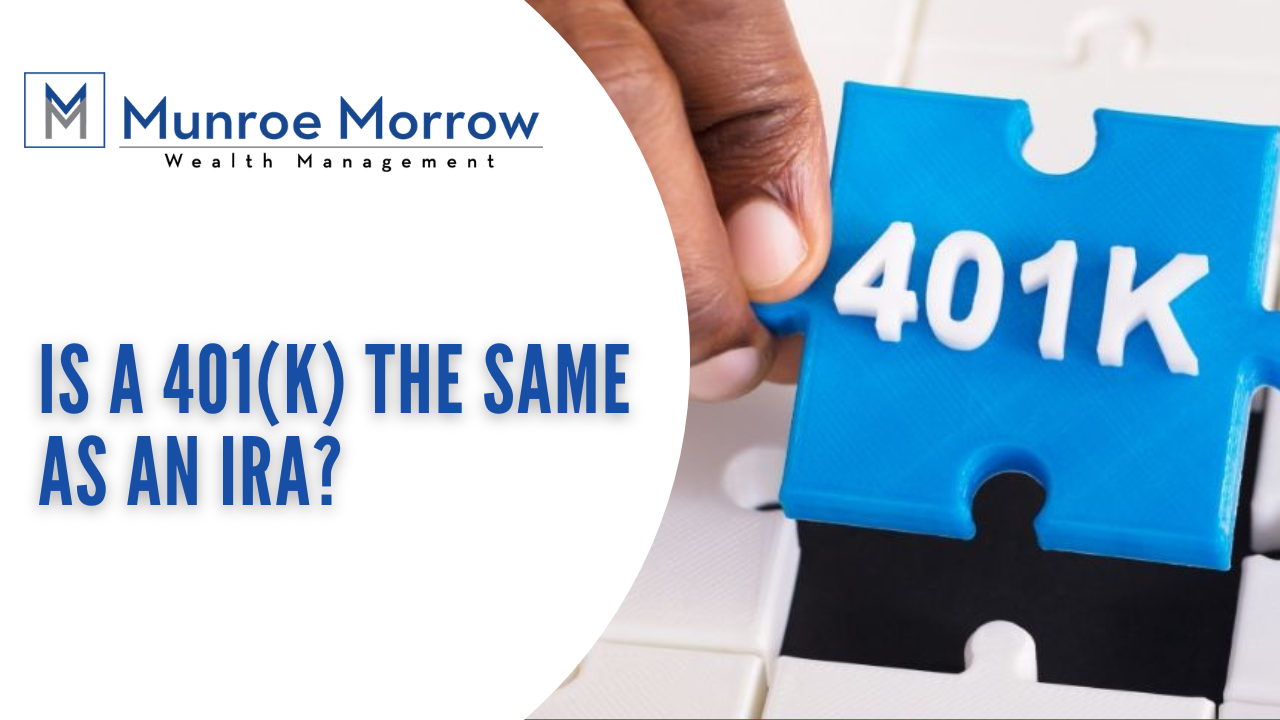 |
Saving for retirement is crucial, but did you know that how you save can make a huge difference in your long-term retirement outlook? There are many ways to save, but not all options are created equal. Two of the most popular retirement savings vehicles are an individual retirement account (IRA) and an employer-sponsored retirement plan, such as a 401(k). Contrary to common misconception, these accounts are not the same. In this article, we’ll discuss the key differences and how you can decide which account makes the most sense for you. |
1. Contribution Limits
One major difference between a personal IRA and an employer-sponsored retirement plan is the contribution limit. For the 2023 tax year, you can contribute up to $6,500 per year if you are under the age of 50, or $7,500 per year if you are age 50 or older.
On the other hand, the maximum elective deferrals (the contributions that an employee makes) for 401(k) plans is $22,500 if you are under the age of 50, or $30,000 per year if you are age 50 or older. When employer contributions are included, the contribution limit jumps up to $66,000 per year or $73,000 with catch-up contributions.
<pAlthough it is wise to make sure you contribute enough to receive any matching contributions offered by your company through a 401(k), any additional contributions you wish to make can go into either the 401(k) (up to its contribution limit) or an IRA (up to its contribution limit). Keep in mind that IRAs are subject to the income limitations described below, whereas the ability to contribute to an employer-sponsored retirement plan is not restricted by income.
2. Investment Options
IRAs are opened individually and have no connection to your employer’s retirement plan. This means, you have a much greater level of control over your investment options. With an IRA, you can choose from a wide range of stocks, bonds, mutual funds, index funds, and even REITs. With a 401(k) plan, your employer selects a limited number of investment offerings.
With fewer investment options, a 401(k) may not offer as many low-fee choices as an IRA. It’s important to watch out for hidden fees and management costs with the various funds your 401(k) offers.
3. Tax Implications
Traditional contributions to a 401(k) are tax deductible, no matter what your total income or tax filing status is. Whereas traditional contributions to an IRA are tax deductible only as long as your income does not exceed certain limits and you are not covered by a workplace retirement plan. Taxes on IRA and 401k contributions are deferred until retirement.
Alternatively, if you contribute to a Roth account (401(k) or IRA), all growth and contributions grow tax-free, but you will receive no tax benefits in the current year.
Are You Making the Most Out of Your Retirement Savings Accounts?
Depending on your preferences and income level, you might choose to contribute up to the maximum amount annually into an IRA, and also contribute up to the maximum amount annually to your 401(k). Depending on how advantageous the employer’s match on your contributions, and the available employer-selected options in your 401(k), this could be a wise strategy.
No matter what your situation is, your retirement savings choices will have a long-term effect on your portfolio growth and your ability to achieve your financial goals. So if you’re unsure about whether you’re maximizing your retirement savings options, we can help. To see if we’re the right fit for your financial needs, reach out today by calling 617-600-5488 or emailing info@mmwealthmanagement.com.
About Greg
Greg Munroe is the CEO and founder of Munroe Morrow Wealth Management, a firm of independent financial advisors that provides clients personalized financial planning, investment management, and insurance protection, Greg has served the needs of individuals, families, and business owners seeking comprehensive financial solutions and personalized asset management strategies since 1993. He enjoys being a game-changer in people’s financial lives. Greg thrives on building personal relationships with clients as he strives to give financial advice a good name and give his clients confidence in their financial future.
Greg lives in the greater Boston area with his wife, Jessica, and four children, Joey, Leo, Jake, and Bradley. Outside of work, he enjoys reading, listening to music, lifting weights, playing with his boys, and coaching their basketball teams. To learn more about Greg, connect with him on LinkedIn.
The opinions voiced in this material are for general information only and are not intended to provide specific advice or recommendations for any individual.
Contributions to a traditional IRA may be tax deductible in the contribution year, with current income tax due at withdrawal. Withdrawals prior to age 59 ½ may result in a 10% IRS penalty tax in addition to current income tax.
A Roth IRA offers tax deferral on any earnings in the account. Qualified withdrawals of earnings from the account are tax-free. Withdrawals of earnings prior to age 59 ½ or prior to the account being opened for 5 years, whichever is later, may result in a 10% IRS penalty tax. Limitations and restrictions may apply.

